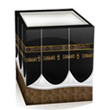Concerning the Hadeeth ''Ghurbatul-lslam''
- Details
- Category: Sheikh Bin Baz
- Published on Wednesday, 06 November 2013 12:14
- Hits: 856
Concerning the Hadeeth ''Ghurbatul-lslam''
Question:
What is the meaning of the Hadeeth: ÈÏà ÇáÅÓáÇã ÛÑíÈÇ æÓíÚæÏ ßãÇ ÈÏà ÛÑíÈÇ ÝØæÈì ááÛÑÈÇÁ "Islam began strange and it will return strange, so good news is for the strangers." (Muslim no. 145)
Answer:
It means that Islam was strange and new for people in the early days of Islam, in Makkah and Al-Madinah - not many people knew of it, and fewer still believed in it and practiced it. After that it spread and people entered the fold of Islam in droves, and it was victorious over all other religions. But later on, during the final times, Islam will return as strange - only a few people will truly know Islam and only a few will correctly apply it, and they are the "strangers." The Hadeeth:
ÝØæÈì ááÛÑÈÇÁ
"Good news is for the strangers" (Muslim no. 145)
is further explained in a narration of Muslim and others:
ÇáÐíä íÕáÍæä ÅÐÇ ÃÝÓÏ ÇáäÇÓ
"Those who are righteous when the people will be corrupt." (Ahmad no. 4/67)
And in yet another wording,
ÇáÐíä íÕáÍæä ãÇ ÃÝÓÏ ÇáäÇÓ ãä ÈÚÏí ãä ÓäÊí
"They are the ones who will make right what people have corrupted of my Sunnah." (At-Tirmithi no. 2630 and Al-Baghavi 1/121)
We ask Allaah to make us from them; indeed, He is the best to ask.
Shaykh `Abdul-`Azeez Bin Baz
Fatawa Islamiyah, Vol. 7, Pages 175-176, DARUSSALAM





















